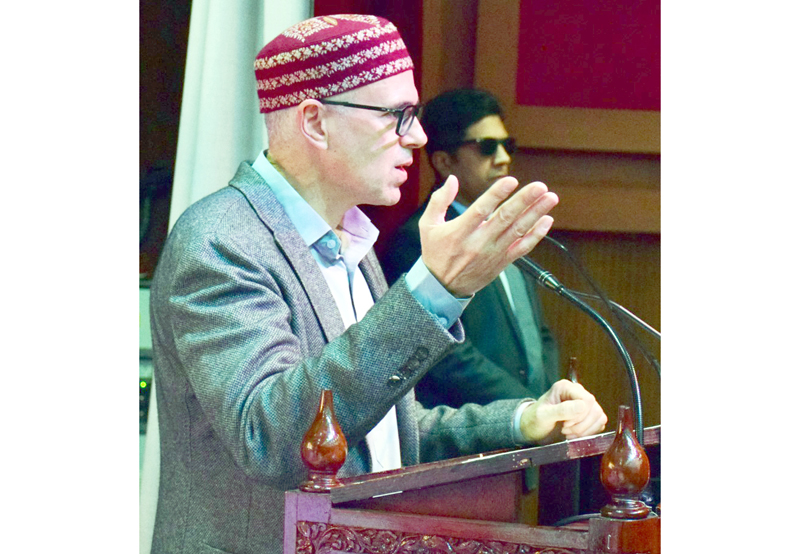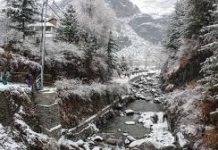JAMMU, Dec 15: The National Conference Government will provide 200 units of free electricity to the people of jammu and Kashmir from March next year as focus presently is on to provide maximum power supply to the people during harsh winters.
This was announced by Chief Minister Omar Abdullah while speaking with a national Hindi news channel.
“We will provide free units of electricity to the people from March next year. Presently, in the harsh winters, our focus is to give maximum electricity supply to the people,” he said.
The National Conference in its election manifesto had promised 200 free units of power to the people of Jammu and Kashmir.
On job opportunities for the youth, the Chief Minister said many vacancies have been referred to the recruitment agencies.
“We will fulfil all promises made to the people in five years and produce our record to the people before seeking votes next time,” he said.
Meanwhile, opening another point of friction with an important ally, Omar has dismissed the Congress party’s vehement objection to Electronic Voting Machines, and echoed the BJP’s defence — you can’t accept election results when you win, and blame EVMs when you lose.
“When you get a hundred plus members of Parliament using the same EVMs, and you celebrate that as sort of a victory for your party, you can’t then a few months later turn around and say… we don’t like these EVMs because now the election results aren’t going the way we would like them to,” Abdullah said in an exclusive interview on Friday.
Told that he sounded suspiciously like a BJP spokesman, Abdullah reacted with “God forbid!” He then added: “No, it’s just that… what’s right is right.”
He said he speaks based on principles rather than with partisan loyalty and cited his support for infrastructure projects like the Central Vista as an example of his independent thinking.
“Contrary to what everybody else believes, I think that what’s happening with this Central Vista project in Delhi is a damn good thing. I believe constructing a new Parliament building was an excellent idea. We needed a new Parliament building. The old one had outlived its utility,” he said.
He said parties should not contest elections if they do not trust the voting mechanism.
“If you have problems with the EVMs, then you should be consistent in those problems,” he said while replying to a question about whether he thinks that the opposition in general and the Congress, in particular, is barking up the wrong tree by focusing on EVMs.
The Chief Minister emphasised that electoral machines remain the same regardless of the election outcome, and parties should not use them as a convenient excuse for defeat.
“One day voters choose you, the next day they don’t,” he said and gave his own example of facing defeat in Lok Sabha polls while winning a majority in the September Assembly polls.
“I never blamed the machines,” he said.
Pooh-poohing the BJP’s criticism of dynasty politics, Omar has said that political lineage is not a “lifelong ticket” to success and questioned why the ruling party doesn’t raise the issue with its allied parties which can also be accused of perpetuating dynasties.
Abdullah was responding to a question whether his family’s fourth generation will go into politics, and if that would expose him to fresh criticism of perpetuating dynastic politics the way the Congress party and other opposition parties have been.
Abdullah’s two lawyer sons have recently made forceful political commentaries, especially on the issue of the abrogation of Article 370 of the Constitution that took away Kashmir’s special status, an emotive issue among Kashmiris. They also campaigned extensively with their father during the September Assembly elections.
“Whatever space they choose to carve out, they will have to make for themselves. Nobody is going to give them anything on a plate,” said Abdullah, whose grandfather Sheikh Abdullah is considered the founding father of the post-independence State of Jammu and Kashmir.
His father Farooq Abdullah was also a Chief Minister for decades, and Omar Abdullah returned as Chief Minister for a second time in October.
“Belonging to a political family is not a lifelong ticket for success. And I don’t need to point towards anybody else. I’ll just talk about myself. I lost an election this year,” he said, referring to his failed bid in the Parliamentary elections earlier this year.
However, he contested in the Assembly elections in September and won handsomely. “I’m the same person, same family, same political party,” he said.
He said the BJP’s criticism of dynasty politics is simply political hypocrisy.
“The BJP only seems to oppose political dynasties when it’s convenient. They have no issues with dynastic politics among their allies,” he said.
“I don’t need to point out the number of dynastic allies that the BJP has or has had in the past or will have in the future. So, I have always maintained that the BJP doesn’t have a problem with political families. They have a problem with political families that are opposed to the BJP,” he said.
From the BJP’s vantage, he said, politicians are neither dynasts nor corrupt once “you are an ally of the BJP.”
Asked if he will still give guidance or political advice to his sons, Zamir and Zahir, Abdullah, 54, said, “I have told them that as elected representatives … we are basically glorified daily wagers. We are here today. We will probably not be there tomorrow.”
He then gave his example, saying his party and he were elected in 2014. Then “we were dropped out of office in 2018 and we didn’t come back until 2024. So, you need something (an income and profession) to fall back on,” he said.
Drawing parallels with other fields like acting and sports, he highlighted that initial advantages of family connections quickly fade.
“Some get recognised initially, but if you can’t perform, no one will carry you,” he said.




